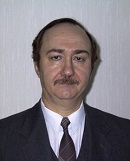

Plenary Lecture
Development of the Metal Granulation Methods Based on Parametric Control in Continua for the Unique Materials’ Production

Professor Ivan Kazachkov
Energy Technology Department
Royal Institute of Technology (KTH)
Sweden
&
Head of Department of Applied Mathematics and Informatics
Nizhyn State University
Ukraine
E-mail: Ivan.Kazachkov@energy.kth.se
Abstract: The general and specific peculiarities of parametrically excited oscillations and the new parametric effects revealed are presented and discussed for the important engineering and technological applications. First the general statement and substantiation of the problems studied is considered, and then the various parametric oscillations in continua are analyzed from common methodological base. Also the assessment of a current state of the problems, analysis of their features, prospects of further development and the main difficulties of the methodological, mathematical and applied character are presented.The results by development of physical, mathematical and numerical models for parametric excitation and suppression of oscillations on the interfaces separating continuous media, for carrying out computing, physical and natural experiments by revealing the new phenomena and parametric effects, and for their use in improvement the existing and creation the perspective highly efficient technological processes are presented. Scientific novelty of this work consists in development of the theory and applications of parametric excitation and suppression of oscillations on the boundaries of continua on the samples of three tasks’ classes: flat and radial spreading film flows of viscous incompressible liquids; surfaces of phase transition from a liquid state into a solid one, etc. The external actions considered are: alternating electromagnetic, vibration, acoustic and thermal fields. Along with linear the non-linear parametric oscillations are investigated (including strongly non-linear) and the results of theoretical studies are confirmed and supplemented with the corresponding experimental data. The theoretical results allowed constructing the new granulation machines for producing metal granules with cooling rate up to 104 K/s. The unique granules are used to produce the new specific materials with strong properties.
Brief Biography of the Speaker: Ivan V. Kazachkov is Mechanical Engineer who had earned his PhD (Candidate of Physical and Mathematical Sciences, 1981) and MSc (1976) from the Kyiv National T. Shevchenko University. He got Full Doctorship (1991) in Engineering Sciences from the Institute of Physics of the Latvian Academy of Sciences in Riga. He became Full Professor at the Institute of Electrodynamics of the National Ukrainian Academy of Sciences since 1989, after 1995 he has been Head of Dept and Principal Investigator at the State scienfifc and Technical Center on Nuclear and Radiation Safety of Ukraine. During 1998-2004 Ivan Kazachkov has worked at the KTH, Energy Technology Dept as Guest Professor, then during 5 years was teaching and doing research at the National Technical Univeristy of Ukraine “KPI” continuing his work part-time as Visiting Professor at KTH, teaching numerical methods and doing research in modeling of multiphase systems. Since 2008 till present time he is Affiliated Professor at the KTH. Since 2009 Prof. Kazachkov is Head of Department of Applied Mathematics and Informatics at the Nizhyn State University named after M. Gogol, during 2010-2012 was also part-time Head of Dept on Energy Saving and Heat Power at the Ukrainian Academy of Civil-Communal Economy in Kyiv. The research activities of Prof. Kazachkov include Parametric Control in Continua, Multiphase Flows, Controlled Film Flow Decay, and Granulation of Metals for Special Metallurgy, Modeling and Simulation. He has over 200 publications in scientific journals and conferences, 5 patents, 10 monographs and lecture notes. He participates in the European research programs and committees. Five PhDs have defeded their dissertation under his supervision and a number of PhD students is doing research presently under his supervision.